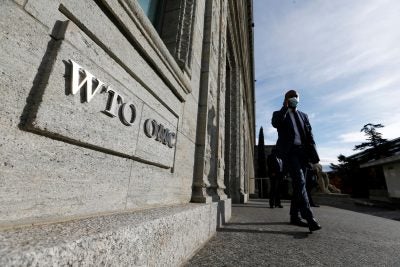The spread of the new coronavirus variant forced the postponement of a major gathering of the world’s top trade officials. But it has not quelled the quest for substantive reforms to the lumbering and ineffective World Trade Organization.
The meeting of trade ministers at the WTO’s headquarters in Geneva was slated for Nov. 30 through Dec. 3, just as news broke about the omicron variant. The WTO put off the meeting of top-level trade officials from around the globe until sometime in 2022.
U.S. industries are hopeful that governments will use the interregnum to map out reforms that go deep and wide — well beyond a bureaucratic facelift for a global institution whose mission is the monitoring of trade between nations and the policing of those that flout the rules. Many hope to finally turn the WTO into the effective organization it was always intended to be, one that promotes the freest trade possible between nations.
It’s a prospect that has tremendous implications for U.S workers and industries, some of which have fallen victim to unfair trade practices because of the WTO’s failures.
Improving the WTO is an enduring priority for many global leaders. Members of the G-7, a group representing the world’s wealthiest economies and liberal democracies, have long complained that the WTO averts its gaze from foreign subsidies that are skewing markets and damaging whole sectors of the economy. The G-7 is composed of the United States, Canada, France, Germany, Italy, Japan and the United Kingdom.
The group is taking a keen interest in the meeting, with the G-7 trade chiefs pushing for key reforms designed to advance “the effectiveness of the WTO’s monitoring, negotiating and dispute settlement system functions, which requires resolving long-standing issues.”
Chief among these issues is getting the WTO to do its job, especially when it comes to countries that subsidize industries to gain an advantage. One example creating ongoing frustration is the WTO requirement that member states submit annual subsidy notifications to the organization, the idea being that transparency is a precursor to freer trade and that documentation of subsidies allows states to seek remedies.
But as the WTO acknowledges, many countries routinely ignore this rule without penalty. The organization’s leadership has concluded that “despite reminders to members to submit their (subsidy) notifications in time, 80 members have still not submitted their 2019 notifications. In addition, 67 members still have not submitted their 2017 subsidy notifications, and 57 have still failed to submit their 2015 notifications.”
In short, member nations going back at least seven years have failed to alert trading partners to their subsidies while the WTO sits on its hands. It is the antithesis of free trade and the ramifications are all too real for member state economies.
A case in point is the WTO’s failure to address the subsidies dogging the global sugar trade. For years, almost all sugar-producing countries have been engaged in distorted trade and production practices resulting in a highly dysfunctional sugar market. Yet the WTO has been largely powerless to rein in mega-subsidizers like Brazil, India and Thailand.
Without a truly global market in place, the U.S. government has turned to interest-bearing loans for U.S. sugar producers and import quotas to protect U.S. consumers and farmers from the glut of subsidized sugar, thus operating without taxpayer cost. From a free-market perspective, it is not an ideal response, but the breadth of foreign subsidies – and the inaction of the WTO – have left little choice.
Of course, reforms at the WTO alone won’t solve the vast sugar subsidy problem created by these years of neglect. The U.S. must also advocate for a so-called zero-for-zero policy to help undo the deeply embedded imbalances. This approach would eliminate U.S. sugar quotas — but only after foreign countries eliminate their sugar subsidies. Such reciprocity would allow prices to be based on actual costs, not twisted out of shape by government intervention.
The WTO’s mission, it trumpets, “is to ensure that trade flows as smoothly, predictably and freely as possible.” It’s time to make good on that long-neglected aspiration, starting with the global sugar market.
Gerard Scimeca is an attorney and vice president of CASE, Consumer Action for a Strong Economy, a free-market-oriented consumer advocacy organization.
To read the full commentary by the Post and Courier, please click here.

